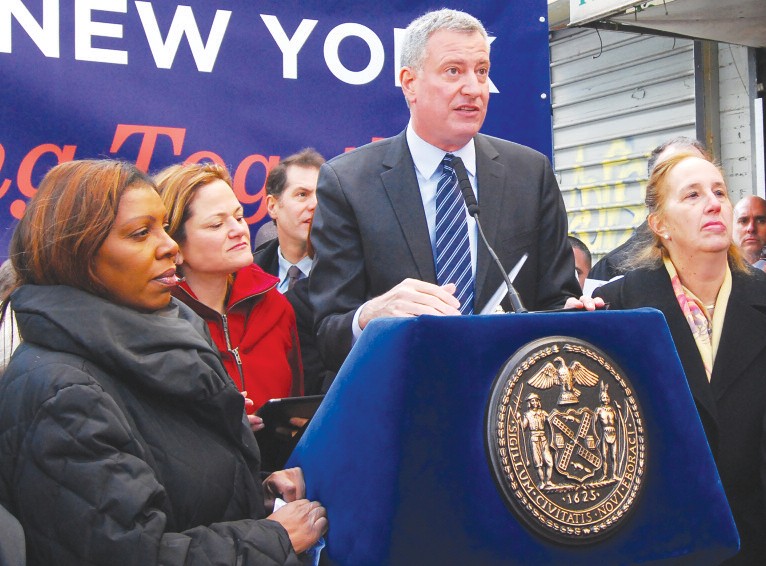Paves Way For New Apartments
Plans to rezone an industrial area of Ridgewood for residential development received approval from Community Board 5′s Zoning and Land Use Committee during its meeting Monday night, Apr. 7, at the board’s Glendale office.

Before a crowd of Ridgewood residents, the committee recommended approval of a zoning change affecting the area of Ridgewood generally bounded by Flushing Avenue, Starr Street and Woodward and Onderdonk avenues.
The proposal was put forth by the City Planning Commission and the owners of 176 Woodward Ave., a vacant manufacturing-zoned lot, who seek to erect on the site a four-story apartment house with 88 units and up to 118 parking spaces in an underground garage. The structure would also include a 1,500 sq. ft. community room.
Repeating comments voiced at a Board 5 public hearing on the matter last month, Ridgewood residents living near the site told committee members they welcomed the proposal.
Antonia Guzman stated the lot- presently used to store construction vehicles and equipment-is a magnet for prostitution, littering and other quality-of-life problems. Having a residential building there, she claimed, would help make the area clean and safe.
“We’re better off with building these houses,” added Ridgewood resident Mervin Paugh. “I’m for building these houses. Something should be done.”
Others in the area, however, voiced concerns over how the project would impact rent levels in the surrounding community.
Rob Solano, executive director of Churches United for Fair Housing based at St. Brigid Church in Brooklyn, noted rents have been “going up little by little” in Ridgewood and Bushwick as the demand for housing increased in recent years. The new development, he feared, may drive rents beyond a reasonable point for most residents living in the community.
Attorney David Schwartz, speaking on behalf of the owner of 176 Woodward Ave., tried to allay those fears, noting all rents in the proposed apartment house would be stabilized for at least 15 years. The owners agreed to rent stabilization in order to receive a 421-A state tax abatement for the same period of time.
As previously reported, proposed rents for the building range from $1,000 for each studio unit to $1,800 for a three-bedroom apartment.
Rent stabilization, Schwartz explained, would affect the building’s first tenants, as their rents would only increased annually on rates agreed upon by the Rent Stabilization Board.
“If a tenant leaves, at the end of the [15-year tax] exemption period, the apartment will no longer be rent stabilized,” he noted. Schwartz later suggested the owners were charging rents at or lower than the market rate for similar Ridgewood dwellings.
Resident Manny Jalonschi also cautioned the committee that provisions must be made to ensure the new building does not overwhelm local schools and infrastructure. He also expressed reservations about the loss of manufacturing areas, which could jeopardize long-term economic development in the neighborhood.
Those sentiments were echoed by committee members Paul Kerzner and Ted Renz, who offered an alternative development and zoning plan. Kerzner suggested the Department of City Planning institute “MX” mixed zoning code in Ridgewood to allow the developer to build a four-story building, with the ground floors occupied by “industrial condos” and the upper floors reserved as condominium or co- operative apartments.
“There is a growing momentum for manufacturing jobs. They are coming back to the city,” Kerzner said, adding that there needs to be space for such industries to return. Selling industrial condos, he noted, would prove affordable for light manufacturers such as textile producers.
“I see this as a policy issue,” Renz added. “Having a mixed use community is a very efficient community,” as many residents would be within walking distance from their jobs.
Kerzner also feared a precedent would be set by the board recommending the conversion of industrially-zoned property to residential space. If this proposal were to proceed, he claimed, property owners in other manufacturing areas in Board 5’s confines would seek similar changes.
Tom Smith of the Department of City Planning called the MX idea “very interesting,” but cautioned it would need “to be looked at extremely closely” in the future.
Mandating that owners develop condominiums or co-operative apartments would also be “difficult, if not impossible,” Smith added.
Committee member Kathy Masi also dismissed the notion of a precedent, as the situations would differ depending on each individual case. Another committee member, Daniel Creighton, charged the board had no right to tell a property owner what to do with their property.
The committee’s resolution in support of the rezoning and development was scheduled to be voted on by Board 5 at its meeting last night, Wednesday, Apr. 9. More details will be featured in next week’s issue.
What’s your opinion?
Send an email to
info@timesnewsweekly.com


































